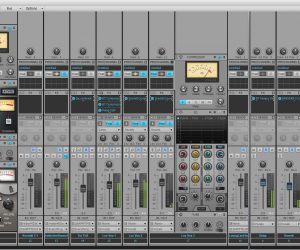
Review: Extreme Isolation EX-29 Headphones
Some 11 years ago, back in Issue 35, we first looked at a pair of Extreme Isolation headphones. So what’s changed in the world of ‘gun muff’ cans? Not so much, as it happens.
Some 11 years ago, back in Issue 35, we first looked at a pair of Extreme Isolation headphones. So what’s changed in the world of ‘gun muff’ cans? Not so much, as it happens. Extreme Isolation still has the market largely to itself: performance headphones with considerable acoustic isolation afforded by industrial strength ear cups.
The EX-29s are a more recent addition to the range and offer 29dB passive attenuation over the original Ex-25’s 25 decibels (the clue is in the name).
These ’phones are made in the US, and feature similar specs to the 25s: 40mm single drivers, 32Ω impedance, and a sensitivity of 114dB at 1kHz/1mW (which is more sensitive than the EX25s). They’re a comfortable headphone and they sound good.
I guess my assumption was that Extreme Isolation is happily sacrificing some sonic fidelity in the pursuit of maximum attenuation. And to a degree this is always going to be true — these aren’t designed as ‘close your eyes/stroke your chin’ reference headphones, they’re studio workhorses. That said, they sound excellent. There’s a solid low-end, but not an emphasis that throws the tonal balance out, as you may have heard from bass-heavy DJ headphones. They’re not amazingly ‘transparent’ but there is real clarity. And for around $200 a throw, you can afford to have a handful of these in the live room and you won’t hear a word of complaint from anyone, I can guarantee it.
Closed back headphones are an essential in the studio. The advantage of using Extreme Isolation closed backs is you get an extreme lack of bleed into open mics, which can be a deal breaker for more delicate instrumentation.
To be clear — if you’re looking at it from an outside-in perspective — Extreme Isolation gets its attenuation from the gun muff-style design of the ear cups, not from any noise cancellation trickery. Being ‘passive’, you don’t have to change batteries and I’d suggest you won’t feel any of the fatigue that’s possible with noise cancellation headphones — which is constantly ‘sucking/blowing’ air into your ears to achieve its attenuation.
Live, I placed the EX29s on the head of a teenage drummer whose mum was concerned about preserving his hearing — which I was happy to encourage. This talented young chap was waiting on a pair of Ear Monitor Australia moulds, so in the meantime I thought I’d feed his monitor mix to the EX-29s. I think one good measure of just how good a pair of cans are is in how fastidious the musician gets about their monitor mix. And, sure enough, this drummer had me dialling him up a full-range mix including a touch of reverb — a far cry from the kick/bass/lead vocal mix he had in his wedge only hours earlier.
Extreme Isolation, the company, was born out of a drummer’s desire to safeguard his hearing over long periods of playing. This really is the EX29’s raison d’etre, and they perform admirably in this regard — they’re comfortable and they feature industry-leading acoustic isolation. The slightly unexpected spinoff is that they’re well priced, they have a superior build quality (the jury is in after around 15 years in the marketplace; they’re pretty much bulletproof) and sound great.
If you’re a drummer, then I’m preaching to the converted — you’ll doubtlessly already know about the advantages of Extreme Isolation headphones and how they can assist in prolonging your playing career. Meanwhile, if you have a recording studio of any type and looking for a pair of live room headphones, then the EX-29s make a very compelling case.
















RESPONSES